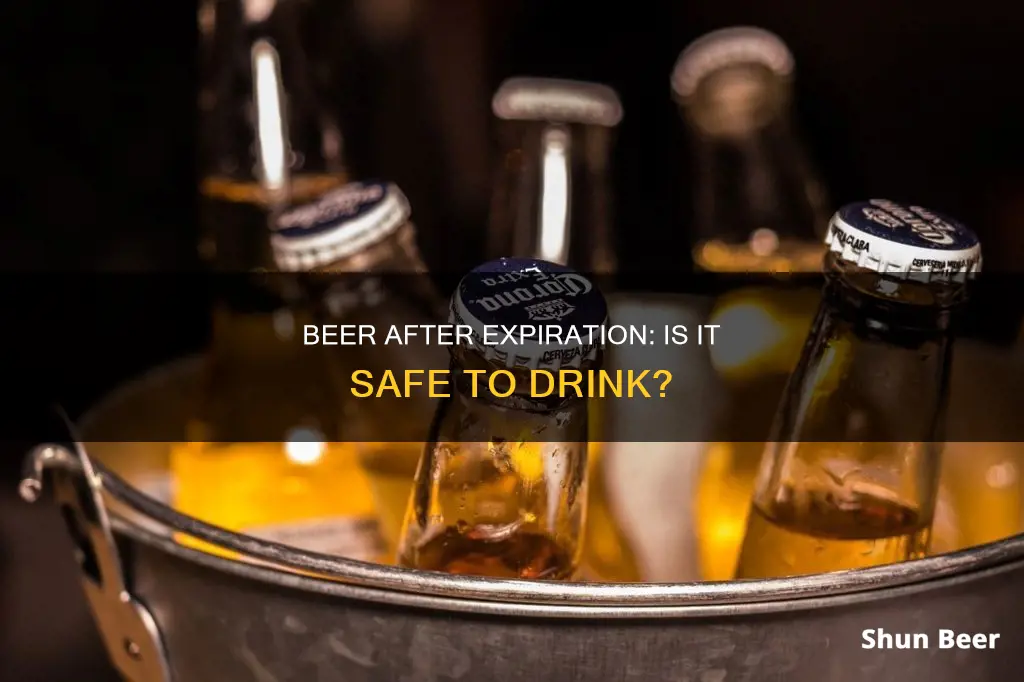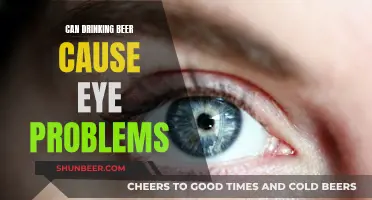
Beer is a perishable product that can be safely consumed past its expiration date, although its flavour and quality will degrade over time. Beer typically lasts four to six months before its flavour begins to decline, but it can be safely consumed after this period. The speed of degradation depends on the alcohol content of the beer and how it is stored, with higher alcohol content and refrigeration slowing the process. While drinking expired beer is harmless, the taste may become flatter, sweeter, and more stale.
| Characteristics | Values |
|---|---|
| Safety of drinking expired beer | Generally safe to drink, but the taste will be affected |
| Beer shelf life | Varies, from 6 months to several years |
| Factors affecting taste | Hops, light, and oxygen |
| Recommended storage | Dark, cool place, preferably a refrigerator |
| Beer type | Higher alcohol content beers have a longer shelf life |
What You'll Learn

Drinking expired beer is harmless to your health
Beer is similar to wine in that it continues to age after bottling, but unlike wine, its taste profile tends to decline over time. The organic compounds that give beer its distinctive flavour and aroma are sensitive to oxygen, light, and heat. When beer is exposed to these elements, its aroma and flavour compounds oxidise and dissipate, resulting in a flatter, sweeter, and more stale-tasting beverage.
However, these changes do not pose any health risks. The main concern with drinking expired beer is the potential disappointment from a less-than-satisfactory drinking experience. The beer may taste odd, stale, or flat, and its bright hops flavour and refreshing bitterness may be replaced by a more distinct maltiness and sweetness.
To prolong the shelf life of your beer and maintain its optimal taste, it is recommended to store it in a dark and cool place, away from direct sunlight. Standard beers, such as IPAs or stouts, are best stored at temperatures between 50 to 54°F (10 to 12°C), while lighter beers like pilsners and lagers should be kept slightly cooler.
Additionally, the alcohol content of the beer plays a role in its shelf life. Beers with higher alcohol by volume tend to have a longer shelf life. So, if you're concerned about taste, it's best to consume beer within three to six months of packaging or before the best-by date.
Beer Mail: Shipping Alcohol Straight to Your Doorstep
You may want to see also

Beer tastes worse over time, not better, unlike wine
Beer is a perishable product that will eventually go bad. Exposure to light, oxygen, and heat will cause the organic compounds that make beer taste and smell great to break down. The speed of this process depends on the alcohol content of the beer and how it's stored—higher alcohol content by volume means a longer shelf life, and refrigeration slows the process of aging.
Unlike wine, beer does not taste better with age. As beer ages, the aroma and flavour compounds found in hops oxidise and dissipate, causing the beer to taste flatter and sweeter. While some aromatic compounds will increase with prolonged exposure to oxygen, resulting in sweet, sherry-like flavours, the bright hops flavour and refreshing bitterness of fresh lager will be lost.
The drink-by dates on beers are typically four to six months, based on how long the brewer thinks the beer can retain its fresh flavour. After this date, the beer will not be unsafe to drink, but its flavour will continue to degrade over time.
Some people may also find that beer tastes worse to them than to others due to genetic factors. A variation of a particular gene can cause people to find the taste of beer more or less bitter. Additionally, certain foods, such as flavoured crisps, can cause the malt taste profile of beer to taste strange when consumed before drinking beer.
Last Night's Beer: Is It Still Good?
You may want to see also

Beer typically lasts between four and six months
Beer is a perishable product that stales when exposed to light, oxygen, and heat, which degrade the organic compounds that make beer smell and taste great. However, even when its flavour is declining, it can be perfectly safe to drink.
The simple answer is yes, it is safe to drink beer after its expiration date, since most beer is either pasteurised or filtered to eliminate bacteria, making it extremely resistant to spoiling. How the beer will taste is another matter.
The taste of expired beer is likely to be flat and more sweet. The alcohol content of the beer and how it is stored will determine how quickly the beer's flavour degrades. Refrigerating beer slows the process of ageing, so always choose beer that is in the cooler, not on the shelf. Beers with more alcohol by volume have a longer shelf life.
To prolong the shelf life of your beer, it is recommended to store it in a dark place, out of direct sunlight, and at the right temperature.
Is Beck's Non-Alcoholic Beer Safe for Recovering Alcoholics?
You may want to see also

Refrigerating beer slows the ageing process
Beer is a perishable product that stales when exposed to light, oxygen, and heat, which degrade the organic compounds that make beer smell and taste great. However, even when its flavour is declining, it can be perfectly safe to drink. The simple answer is yes, since most beer is either pasteurised or filtered to eliminate bacteria, it's extremely resistant to spoiling.
How long a beer can be stored depends on a few factors. Firstly, the ingredients in your beer; flavours such as hops (which are flowers) deteriorate quickly, so beer that relies heavily on a strong hoppy taste, such as double IPAs, should not be aged. Beers with a high ABV often age well because, like other high-alcohol beverages, the alcohol content itself acts as a preservative.
The temperature at which the beer is stored is also important. Heat will make beer deteriorate quicker, whereas if beers are left too cold, they will not age properly and the flavours won't develop. Refrigerating beer slows the process of ageing, so always choose beer that is in the cooler, not on the shelf. Beers with more alcohol by volume have a longer shelf life. Beers should be stored in total darkness at all times and kept at a temperature of between 45° F and 65° F; ideally sitting as close to 55° F as possible. This temperature is perfect as it allows the flavours to develop in your beer without any heat causing unwanted damage.
Is Root Beer Safe for Dogs to Drink?
You may want to see also

Beer is similar to canned food in that it is safe to consume after the best by date but may lose flavour
Beer is similar to canned food in that it is safe to consume after the best-by date but may lose flavour. Beer is a perishable product that stales when exposed to light, oxygen, and heat, which degrade the organic compounds responsible for its taste and aroma. However, unlike canned food, beer does not typically carry an expiration date, and it is generally safe to drink even past its best-by date.
The absence of harmful pathogens in fully fermented beer means that it does not "go bad" in the sense of becoming unsafe to consume. Instead, the beer may undergo flavour changes, becoming flat, stale, or developing off-odours. The hops in beer, responsible for its bitter taste, can become muted, and oxidation can produce an unrefined bitterness and tones of sherry, paper, or cardboard.
The rate at which beer loses flavour is influenced by several factors. Firstly, the alcohol content of the beer matters; beers with higher alcohol by volume tend to have a longer shelf life. Secondly, the storage conditions are crucial. Refrigerating beer or storing it in a cool, dark place slows down the ageing process, preserving its flavour for longer.
While drinking beer past its best-by date is generally safe, it is recommended to consume it within three to six months of packaging for optimal flavour. Additionally, it is worth noting that some beers, such as IPAs, are more susceptible to losing their hop aromas over time, while others, like stouts and porters, are less affected by ageing.
Drinking Beer While Driving in California: What's Allowed?
You may want to see also
Frequently asked questions
Yes, drinking beer after its expiration date is harmless. Beer is either pasteurized or filtered to eliminate bacteria, so it's extremely resistant to spoiling.
The flavour of beer degrades over time. The beer will likely taste flat and stale, and may smell odd.
Beer is best consumed within three to six months of its packaging date or before its best-by date. Beer stored in the fridge will last longer.
To prolong the shelf life of beer, store it in a dark place, out of direct sunlight, and at the right temperature. Canned beer will also last longer than bottled beer because it's airtight.







